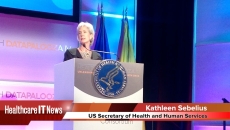Government & Policy
The Fourth Annual Health Datapalooza stayed true to its name. It was, indeed, all about data -- how to liberate data, the need to liberate data, structuring data, promising new data apps, and how data scientists just might have the sexiest career of the 21st century.
A survey of 26 state CIOs being presented at the Government Health IT Conference shows how, post-HITECH, HIEs are being tailored to the needs of states and local communities and markets.
Leading up to next week's Government Health IT Conference, Daniel Newman, MD, CMIO of MEDfx discusses the current state of population health management, how far we have to go, and the need to not lose focus on individual patients.
Addressing widespread concern about meeting the ICD-10 mandate, athenahealth said it will not only guarantee compliance but also help customers track progress and "backstop the revenue cycle" if need be.
HHS Secretary Kathleen Sebelius opens Health Datapalooza IV with an emphatic introduction speech asking those in attendance to continue driving more ideas and innovation in data and information exchange to improve the future of the US health system.
Experts driving next-gen healthcare in America will meet in the Nation's Capital next week. Here's a look at the technologies, policies and progress they'll be talking about.
While criminals tap into traditional skills to thieve tremendous sums from the vulnerable medical ecosystem, by using big data and analytics, healthcare agencies can now reverse the pay-and-chase investigative process to better detect and fight fraud.
The Beacon Communities proved that organizations can advocate changes to how healthcare is paid for by working with payers and providers, while improving quality and safety at the same time. "These were the pillars of the Beacon Community activities, and they taught us," National Coordinator for Health IT Farzad Mostashari, MD, said. "They showed what we needed to do."
IT decisions made today will affect future initiatives and health insurance exchanges' ability to keep pace with healthcare reform.
There are buzz phrases, and then there are buzz phrases. And if there's one phrase that has permeated the healthcare sector more thoroughly than all the others, it's probably "accountable care." But what exactly does it mean? Or, more to the point for healthcare providers, how do you know when you're actually providing it?
